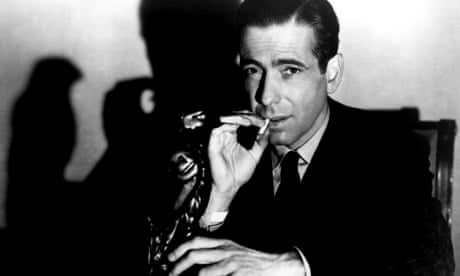Many of us must have been saddened by the news of Humphrey Bogart's death. Some of us have known him on the screen for 21 years. We can remember the day in 1935 when, as "Dook" Mantee in The Petrified Forest, he lounged into the garage cafeteria in the desert and held up waitress Bette Davis, poet Leslie Howard and other benighted travellers at the point of a gun. He was very quiet and sparing of his movements. His voice was rasping, and he had a hint of a lisp, which turned the "S's"into "Sh's". He was lightly built. It took him about 30 seconds to dominate both characters and audience and send a message to the mind that the screen had found a man who must be watched hereafter. We watched him steadily through the remaining 30s, the 40s and the early 50s, in films both good and bad.
I am not prepared to say that Bogart was a great actor, in the sense of being able to enter into a part and become possessed by it. With the right director, especially his friend John Huston, he could hew out a positive and striking figure, but all his characters were really brothers. What was a soft streak in his gangsters was a hard core in his heroes. When you went to a Bogart film, you knew exactly what you were about to see.
As a screen personality, he was unique and stimulating. His leathery face was his fortune. He was a man who, if I may say so in affection, turned ugliness to purpose. He was plainly ugly. Hundreds of handsome huskies pass out along the film assembly line each year, and only the most experienced eye can distinguish one from t'other. But everyone distinguished "Bogey". Twenty years ago, James Agate wrote: "I suffer from a complete disability to remember what any film star looks like except Garbo and Hepburn. These two faces seem to me to have a gloomy significance, like Wastwater on a dull day. Whereas every other film star impresses me like the dimpling waters of Bassenthwaite." But later, he had a kind word for Bogart. "He has charm and he doesn't waste energy pretending to act. He has a sinister-rueful countenance that acts for him. He has an exciting personality and lets it do the work."
Bogart's name will almost certainly be linked with gangster parts. It is true he specialised in gangsters, but they were special types. He never, to my knowledge, played a gangster who had no streak of pity in him. He combined good breeding with good feeling. Apart from his work, he endorsed life as "fun", almost to the point of exaggeration. It is oddly right to look back now and remember that the signature tune for one of his last screen appearances (in Sabrina Fair) was La vie en rose. I think he held our affections for so long because he was honest, kind, had no greater share of good looks than we have, did his job decently and clung to hope.
This is an edited extract

Comments (…)
Sign in or create your Guardian account to join the discussion